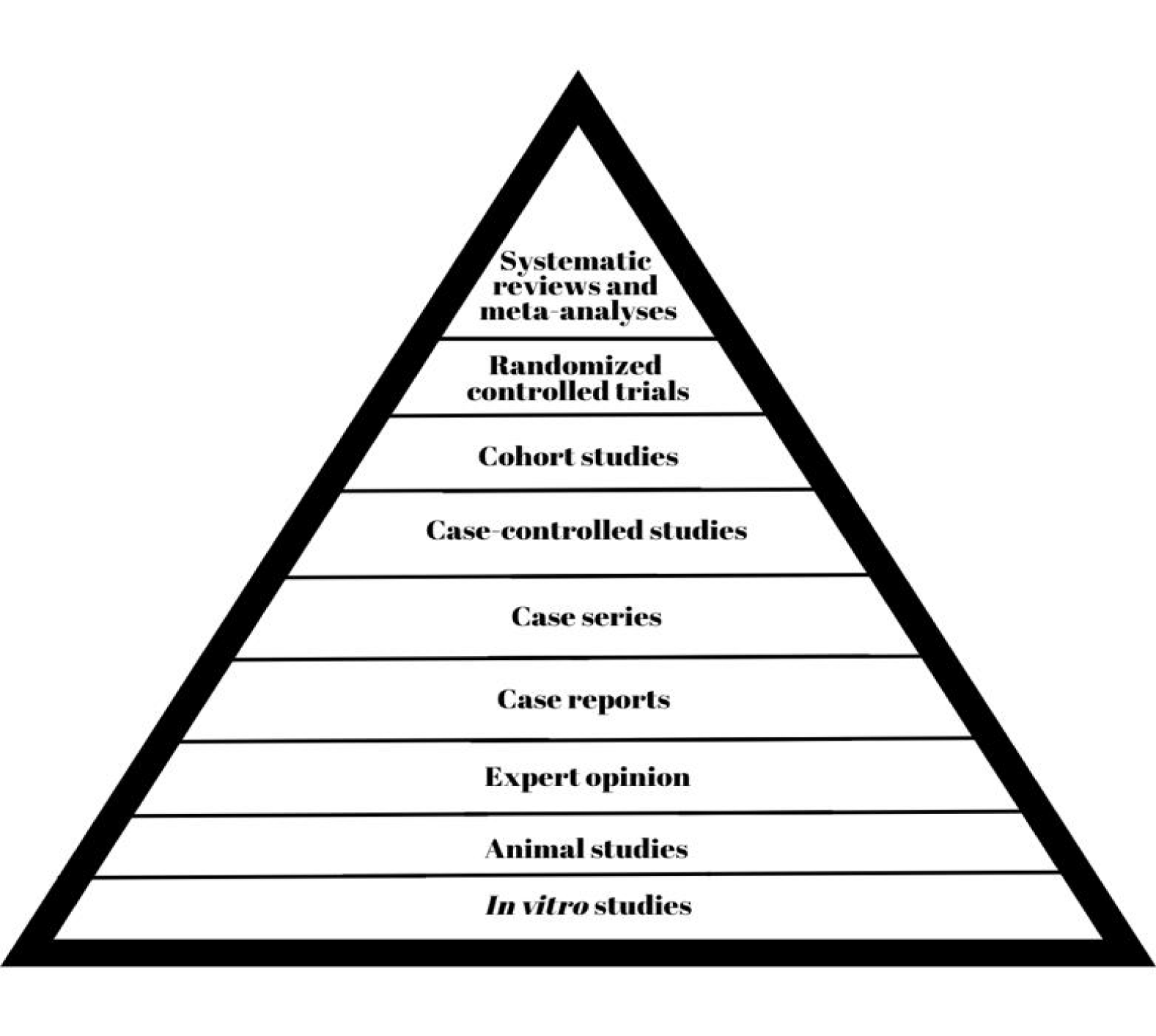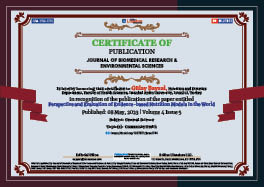General Science . 2023 May 08;4(5):856-859. doi: 10.37871/jbres1744.
Perspective and Evaluation of Evidence-based Nutrition Models in the World
Ayten Begüm Coşkun, Büşra Göz and Gülay Baysal*
- Evidence-based nutrition models
- Healthy nutrition
- Mindfulness in nutrition
Abstract
Nutrition science is an important scientific discipline that is both researched and taught in universities. Its findings are published not only in scientific literature, but also in magazines, newspapers, books, articles, and social media. Professionals and non-professionals often discuss healthy nutrition on television. Healthy nutrition is crucial for achieving a high quality of life, establishing a healthy lifestyle, and preventing diseases. Raising awareness and providing training on food, nutrition, and health issues can improve public health. In education, the basic principle is to determine adequate and balanced nutrition and appropriate physical activity levels for protecting individual and public health. Adequate and balanced nutrition is achieved by consuming recommended amounts of energy and food elements, according to personal characteristics and within a diverse diet. The practice of evidence-based nutrition entails utilizing the most reliable and current nutritional evidence, in combination with clinical experience, to assist individuals in the prevention, management, or coping with physical, mental, and social issues. This practice requires searching for and understanding clinical research, evidence, and nutrition.
Introduction
In Turkey, public interest in health and nutrition news is increasing day by day, and when the keyword "nutrition" is searched on search engines, approximately 52 million results (the data for the year 2022) are obtained in 0.48 seconds. In an issue that has so much data, information confusion and wrong information are side by side with correct information, especially consumers are concerned about the food and beverages they consume. Since consumers do not have sufficient and correct information, they are faced with health problems and the country is adversely affected economically and socially in the long term. According to a statement by the Director of the European Food Information Council (EUFIC), only 27% of health news in European media is based on scientific evidence, no sources are included in 46% of nutrition and health claims, and 49% of claims in the news have not been proven [1].
In Turkey, individuals who are not experts in nutrition, diet, healthy living, physical activity, etc., but have become popular in society and have a wide following, are able to share their experiences or hearsay information on a social media platform that is accessible to everyone. This situation is one of the biggest factors that create the information pollution pile of nutrition science. However, dietitians are responsible for clarifying their knowledge about food and nutrition. It is every expert's responsibility to be sufficiently up-to-date with the scientific literature in order to identify incorrect information about food and nutrition, contribute to its correction, and take a stand against it [2].
According to a study, as a result of an evidence-based case presentation; Plant-based diet was applied to a group of type 2 diabetes patients followed for 22 weeks, and a traditional diet was applied to type 2 diabetes patients in the other group. It was observed that the HbA1c levels of the patients in the plant-based diet were significantly reduced compared to those of the patients on the traditional diet [3].
As a result of a meta-analysis, low-fat diets versus the Mediterranean diet; It has been shown to be beneficial in reducing BMI, systolic blood pressure, fasting blood sugar, and total cholesterol levels [4]. In other prospective studies, in patients with heart failure; The use of a Mediterranean diet has been shown to reduce the risk of sudden cardiac death [5].
In addition, every scientific study and output of every article in the literature should not be shared with individuals and society as definitive, clear, and accurate information by experts. As new studies are added to the literature every day in the field of food and health, different results can be obtained about a topic in the scientific literature, or accurate information can be overshadowed by bias, so health professionals need to share "evidence-based information" with individuals and society through the outputs of systematic reviews. Individuals and groups should be informed with clear, transparent, and proven information in a correct way. In this way, consumers will not be concerned about the food and drink they consume and will have sufficient and accurate information. In short, it is necessary to use the best available evidence in a logical, scientific, and transparent way and share this proven scientific information with individuals or groups (Figure 1) [6].
The Three Basic Principles of Evidence-Based Nutrition
Evidence-based nutrition consists of three basic principles. Firstly, for making optimal clinical decision, it is essential to be knowledgeable about the best current evidence from systematic reviews of the available evidence. Secondly, evidence-based nutrition offers direction in assessing the reliability of the evidence. Thirdly, relying solely on evidence is not sufficient for making clinical decisions. Clinicians should also consider factors such as individuals' dietary habits, risk and cost associated with food choices, and consider individual differences, values, and preferences [7].
What is the Difference between Fact and Opinion?
Evidence-based nutrition covers the difference between fact and opinion. It is known that the number of individuals who can affect human health on the internet, in newspapers, on television, and especially on social media has increased in recent years. These individuals present their own personal inferences as genuine information to the public while portraying themselves as experts. Among this information shared in communication tools such as the Internet, there are outputs based on low-quality or limited research, which causes the society to be misled and exposed to misinformation [8].
Evidence-Based Nutrition and Levels of Evidence
Randomized controlled trials form is one of the most reliable types. In these studies, individuals are randomly divided into two or more groups. One of the groups implied an intervention which can be a specific food and diet. Later, researchers measure the difference in outcomes between the study groups. These studies are the best study type to know whether the outcome can be attributed directly to the intervention and whether any negative side effects are caused by the intervention. A meta-analysis is a study conducted by experts in a particular field, which combines and analyzes the findings of multiple studies that examine a similar topic. Meta-analysis is a quite high level in terms of evidence [9]. The systematic review is a type of research project which clearly formulates a scientific question and answers it. It utilizes systematic and transparent approaches to determine, choose, and evaluate critically all related studies and to gather and analyze outputs from the studies in the review [9].
What is the Nutrition Evidence Library?
The Nutrition Evidence Library is a systematic review organization within the USDA's Center for Nutrition Policy and Promotion (CNPP), which utilizes the most advanced methodology to research, synthesize, and evaluate research related to both of nutrition and food. The Nutrition Evidence Library is comprised of federal nutrition experts and librarians with expertise in systematic review methodology. The main objective of the CNPP is to enhance the overall health of the population by creating and supporting for dietary recommendations that are supported by scientific studies regarding the nutritional requirements of consumers. The Nutrition Evidence Library supports this mission by conducting systematic reviews to inform federal nutrition guidance, policies, and programs. It is important to note that the Nutrition Evidence Library is not a repository, search engine, or database for all food and nutrition research [10].
The question headings in the continuation of the article are systematic review outputs shared in the USDA database examining the association between selected dietary patterns and specific diseases and consist of the "evidence-based nutrition" principle mentioned above [10].
What is the Association between Dietary Patterns Chosen by Adults and Cardiovascular Diseases?
In 2020, the Dietary Guidelines Advisory Committee conducted a systematic evidence review. The results reached by the 2015 Dietary Guidelines Advisory Committee has been confirmed to reflect the current state of science in general. Strong and consistent evidence indicates that certain dietary patterns are associated with reduced risk of cardiovascular disease outcomes. These data include frequent consumption of vegetables, fruits, whole grains, low-fat dairy and seafood products, and occasional consumption of processed red meat, refined grains, sugar-sweetened foods, and sugar-sweetened beverages. Regular eating of nuts, legumes, and moderate amount of alcohol intake have also been seen to be useful dietary patterns in the majority of studies [10].
Randomized controlled trials have provided evidence that healthy dietary patterns can have significant impacts on cardiovascular risk factors, such as blood lipids and pressure. In addition, evidence from studies that define dietary patterns based on specific nutrients show that both less eating of food types rich in saturated fat, cholesterol and sodium, and more consumption of foods rich in potassium as a mineral, fiber, and unsaturated fatty acids are useful in reducing the likelihood of developing cardiovascular disease (2015 Dietary Guidelines Advisory Committee Note: Strong Evidence Level [10].
What is the Association between Dietary Patterns Chosen by Adults and Type 2 Diabetes?
The 2020 Dietary Guidelines Advisory Committee conducted a systematic evidence review. They found that the results reached by them generally shows the current state of science. Moderate evidence suggests that healthy dietary patterns are characterized by more intake of fruits, vegetables, and fiber. On the other hand, consumption of processed meat products, high-fat dairies, types of refined grains, desserts, and sugar-sweetened beverages is related to an increased likelihood of developing type 2 diabetes. (2015 Dietary Guidelines Advisory Committee Note: Moderate Evidence) [10].
Conclusion
As a result, the science of nutrition constitutes the indispensable value of humanity and the most basic need for its survival. With the correct application of evidence-based data in individuals in recent years, it is an indispensable field in the treatment of rapidly increasing diseases worldwide and in building a healthy life. This study emphasizes the importance of evidence-based nutrition and draws attention to the importance of expert and dietitian support for individuals to lead a healthy life.
References
- İşlek MS. The effects of social media on consumer behaviors: A study on social media users in Turkey (Master's Thesis). Karamanoğlu Mehmet Bey University/Social Sciences Institute, Karaman/Turkey. 2012.
- Çetin OI, Kumkale İ. The mediating effect of utilitarian motivation on the relationship between social media usage level and purchasing intention, Balkan and Near Eastern Journal of Social Sciences. 2016;2(4):90-101.
- Trapp C, Levin S. Preparing to prescribe plant-based diets for diabetes prevention and treatment. Diabetes Spectrum. 2012;25(1):38-44. doi: 10.2337/diaspect.25.1.38.
- Chiuve SE, Fung TT, Rexrode KM, Spiegelman D, Manson JE, Stampfer MJ, Albert CM. Adherence to a low-risk, healthy lifestyle and risk of sudden cardiac death among women. JAMA. 2011 Jul 6;306(1):62-9. doi: 10.1001/jama.2011.907. PMID: 21730242; PMCID: PMC3210472.
- Mitrou PN, Kipnis V, Thiébaut AC, Reedy J, Subar AF, Wirfält E, Flood A, Mouw T, Hollenbeck AR, Leitzmann MF, Schatzkin A. Mediterranean dietary pattern and prediction of all-cause mortality in a US population: results from the NIH-AARP Diet and Health Study. Arch Intern Med. 2007 Dec 10;167(22):2461-8. doi: 10.1001/archinte.167.22.2461. PMID: 18071168.
- Maheshwar M, Narender K, Balakrishma N, Rao D. Teenagers understanding and influence of media content on their diet and health- related behaviour. Journal of Clinical Nutrition & Dietetics. 2018;4(2.9). doi: 10.4172/2472-1921.100071.
- Johnston BC, Seivenpiper JL, Vernooij RWM, de Souza RJ, Jenkins DJA, Zeraatkar D, Bier DM, Guyatt GH. The Philosophy of Evidence-Based Principles and Practice in Nutrition. Mayo Clin Proc Innov Qual Outcomes. 2019 May 27;3(2):189-199. doi: 10.1016/j.mayocpiqo.2019.02.005. PMID: 31193887; PMCID: PMC6543447.
- Why ıs evidence based nutrition so ımportant?
- Viana LV, Gross JL, Azevedo MJ. Dietary intervention in patients with gestational diabetes mellitus: a systematic review and meta-analysis of randomized clinical trials on maternal and newborn outcomes. Diabetes Care. 2014 Dec;37(12):3345-55. doi: 10.2337/dc14-1530. PMID: 25414390.
- Food and Nutrition.
Content Alerts
SignUp to our
Content alerts.
 This work is licensed under a Creative Commons Attribution 4.0 International License.
This work is licensed under a Creative Commons Attribution 4.0 International License.









